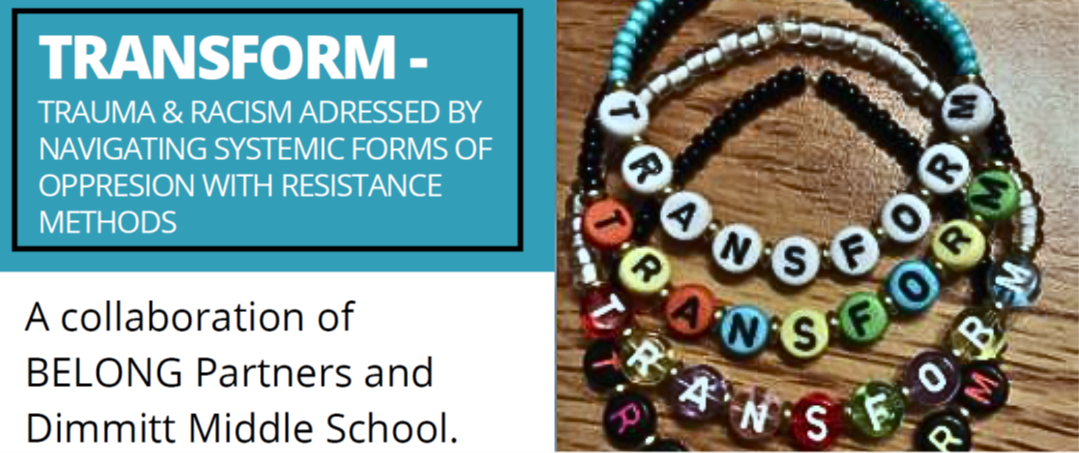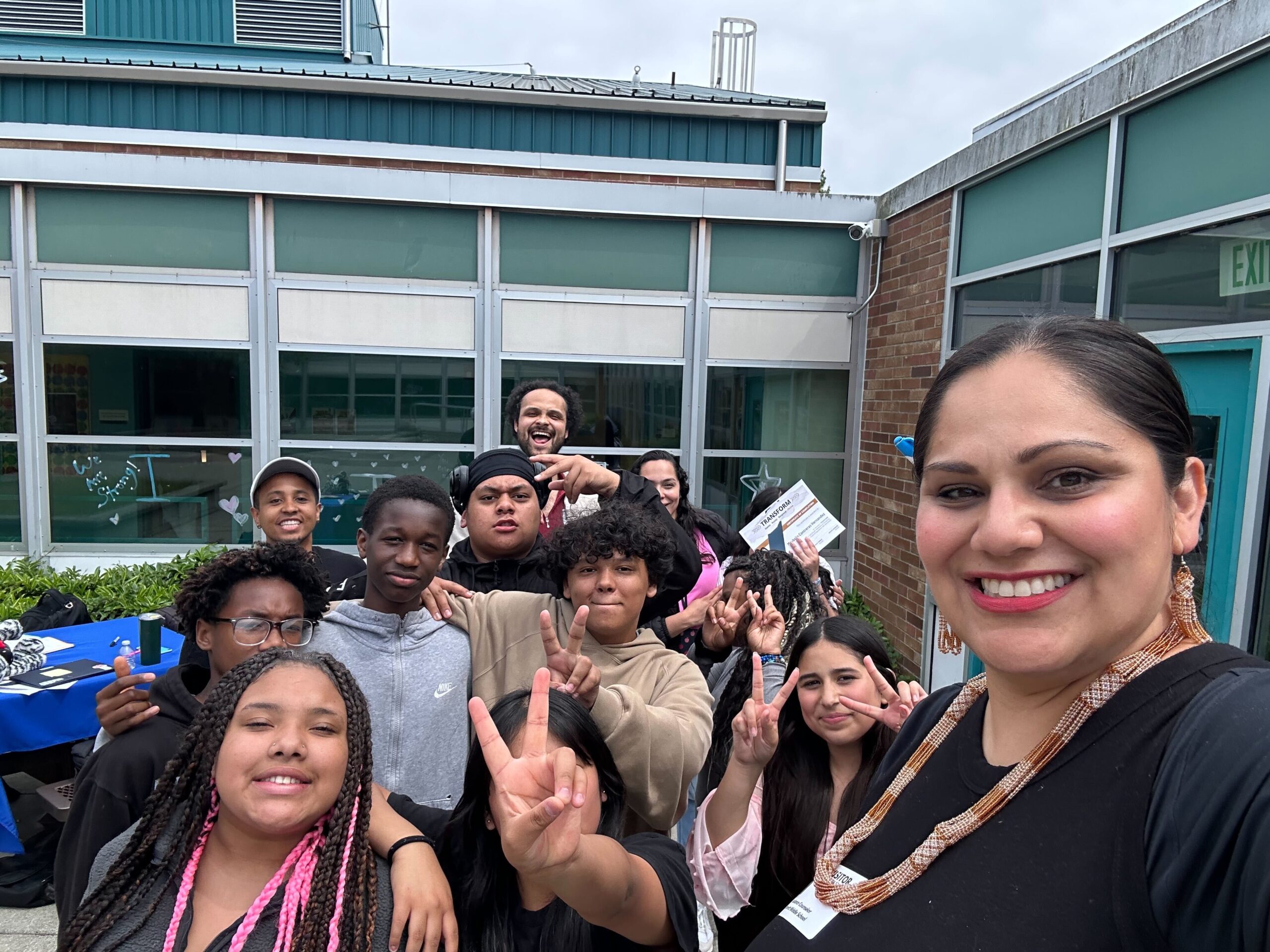TRANSFORM BIPOC Youth Circles at Dimmitt Middle School
As an organization that strives to uplift racial equity in all that we do, we were thrilled this year to be able to bring a program called TRANSFORM (Trauma and Racism Addressed by Navigating Systemic Forms of Oppression using Resistance Methods) to our community. TRANSFORM is a holistic and culturally responsive approach designed to address the stress resulting from traumatic experiences, including racism. It was co-developed by Dr. Won-Fong Lau Johnson and Dr. Farzana Saleem*.
A collaboration with Dimmitt Middle School

In June, we celebrated the completion of our six-week TRANSFORM BIPOC youth circles at Dimmitt Middle School. This impactful program brought together ten students from grades 6-8, one dedicated educator, and three committed BELONG Partners facilitators. Meeting twice a week, we shared our experiences with racism, discussed its impact on our lives, and built empowering tools to support one another. This pilot was the first time the program had been offered in a middle school. One student reflected, “These circles have helped me understand that I am not alone in my experiences and that we can support each other through them.”
Meeting the co-developers of TRANSFORM
The idea for these circles originated when some BELONG Partners facilitators met Alice Coil, the Interim Director of the Office of Racial Equity & Social Justice at Dept of Children and Family Services, at the 2023 LINC Conference – at Highline College. Alice knew the developers of TRANSFORM and wanted to find local facilitators who could bring the program to schools and youth-serving organizations in the Greater Seattle Area. We enthusiastically agreed to pilot this transformative work at one of our partner schools, in partnership with Coil and Dr. Won-Fong Lau Johnson, co-creator of TRANSFORM and Licensed Psychologist and Program Director of Service Systems Program with the UCLA-Duke National Center for Child Traumatic Stress.
The goals of TRANSFORM
As explained in the TRANSFORM manual, the program is a holistic and culturally responsive approach designed to address the stress resulting from traumatic experiences, including racism. Typically, trauma is associated with events like witnessing community violence, surviving natural disasters, invasive medical procedures, or sexual abuse. Historically, experiences of racism, both overt and covert, have not been considered traumatic events as defined by Post-Traumatic Stress Disorder (PTSD) (American Psychiatric Association, 2013). However, research indicates that both individual and cumulative experiences of racial discrimination can be stressful or traumatic for children and adolescents (National Child Traumatic Stress Network, 2017; Williams et al., 2018).
TRANSFORM was primarily developed and led by Black, Indigenous, and other People of Color (BIPOC) with individuals who have both lived and professional expertise in healing practices with BIPOC youth and families experiencing trauma and racism. The program employs a two-pronged approach in training adult facilitators to lead youth groups. The focus is on the four core principles of TRANSFORM: naming, responding, resisting, and thriving in the face of racism. This intervention is designed to improve racial literacy, promote healing, and disrupt the psychological impact of racism on BIPOC youth. It aims to prevent young people from internalizing negative and harmful messages and reduce the perpetuation of these messages by adults. Although the program centers on BIPOC children, adolescents, and families, it welcomes all identities.
The experience of the students and adult facilitators
Roxana Amaral, BP Director of Strategic Partnerships and a facilitator for the TRANSFORM pilot, shared her experience: “Facilitating these sessions was healing for me as a BIPOC identified person. Knowing this work is out there for BIPOC youth fills my heart with hope and empowerment for the future. I remember as a kid, we didn’t have anything like this to help us navigate the harmful impacts of racism. Besides your family, you didn’t talk about your experiences with anyone. When something happened, you bottled a lot of it in without processing it. Often, you blamed yourself and tried to move forward as best as you could.”

As the program wrapped up, the students were able to reflect on the program and have a celebration with Dr. Won-Fong Lau Johnson. When asked about the impact of the program, one student shared, “Prior to this group when people made racist comments I would ignore or get mad. Now, I tell them why it is not right.” Another student said, “This group helps us acknowledge racism and helps us respond.” Another student shared, “This group made me feel less stressed because it was a safe space for us to talk about problems and what is happening. Helped us express how we felt and are dealing with racism.”
The TRANSFORM BIPOC youth circles at Dimmitt Middle School had a positive impact on the students and the adult facilitators. It highlights the importance of such programs in supporting and empowering our youth. We were thrilled to pilot the program and provide feedback to the program developers. We look forward to continuing this essential work and expanding its reach to more schools and communities in the future.
*Please reach out to Dr. Fong Lau Johnson (WonFongLau@mednet.ucla.edu) for more information about the TRANSFORM program if you or your program is interested in bringing this to your site!
Won-Fong Lau Johnson, PhD, NCSP, is a Chinese-American woman with a disability who is raising three multiracial children with her bi-racial, Black husband who are both dedicated to honoring decolonized approaches in all aspects of their lives. Dr. Lau Johnson has made it her life mission to promote decolonized ways of healing for children and families impacted by a range of issues, one of which is trauma. A child of immigrant parents, “trauma” was not conceptualized in the westernized form, fueling her drive to understand it within the context of her social identity, positionality, and the overall context of our westernized society with values that often conflict with her own. This work is all consuming, not siloed just to her personal life but permeates her professional work in everything she does. Currently, she is the Assistant Director for Service Systems Program at the UCLA-Duke National Center for Child Traumatic Stress.
Farzana Saleem, PhD, is an Assistant Professor in the Graduate School of Education at Stanford University. She is a mixed race Black and Asian cisgender woman and the first in her family to obtain a doctorate. She is the daughter of a Black cisgender woman with a disability, who grew up in the south during the civil rights movement. She is also the daughter of a south Asian Indian immigrant father who moved to America in pursuit of the American Dream. From an early age, Dr. Saleem had a passion for hearing people’s stories, honoring others’ lived experiences, and empowering others. This passion arose from her own lived, family, and contextual experiences, which ignited her curiosity about how racism, culture, and positionality (among other things) influence youth’s self-concept and wellness. She is committed to conducting and translating research aimed at promoting racial healing and psychological health of youth of color.
